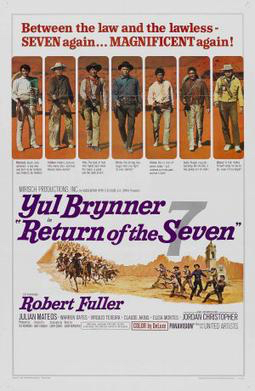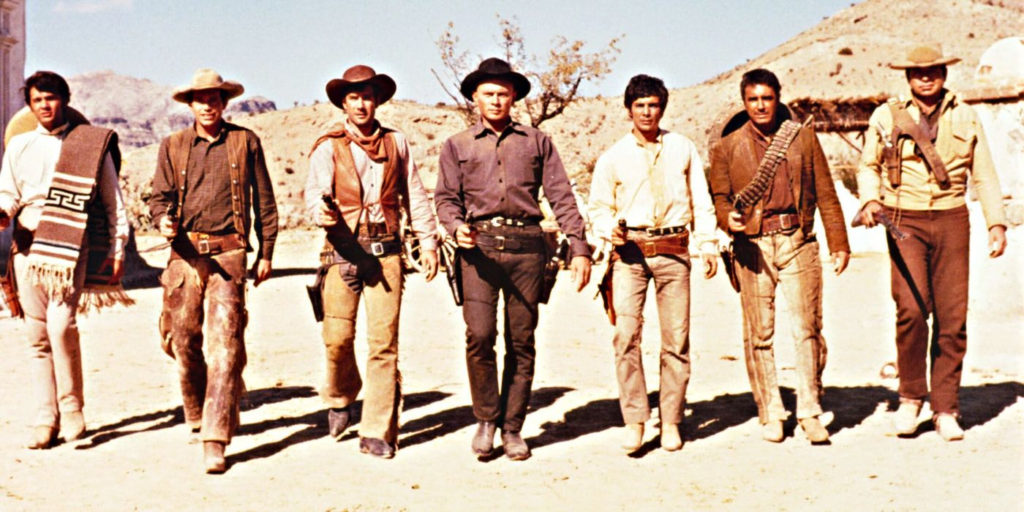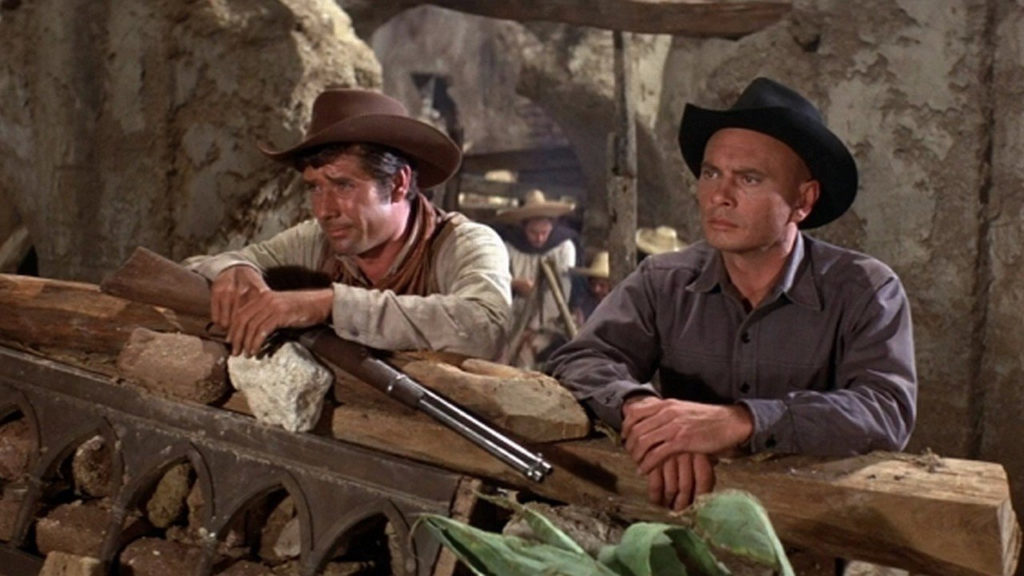It took six years for the Mirisch Company to formulate and produce a sequel to its original hit. During those six years the original film gradually found an audience, partly because its younger stars, as well as Yul Brynner, found genuine stardom, in cinema and on television. In fact, television certainly helped boost viewings and knowledge of The Magnificent Seven; broadcasts of movies became standard fare in the early 1960s as they were sold to networks. In 1977 “TV Guide” magazine conducted a poll of program directors around the country as to which movies were their most popular draws: The Magnificent Seven placed third.

Anyway, the Mirisch company tasked television writer Larry Cohen to write a script reteaming Chris, Vin and Chico (the only characters who survived the first film), and Cohen complied. It was his first feature film script. Two factors complicated the project. First, only Yul Brynner was hired to reprise his role. McQueen was considered, but the two leads had been very contentious on the set the first time around and Brynner objected to bringing him back. It is also said that McQueen found the scenario far too fanciful to be believed — and he may have had a point. Second, Return was scheduled to be shot in Spain, not Mexico, which changed things. The little town from the first movie is history; its replacement in Return looks nothing like it, nor does the scenery surrounding it.
I have little problem with the premise — up to a point. The action begins right away, with a group of bandits riding into what is now Chico’s village, rounding up all of the men they do not shoot, and driving them like cattle away, leaving only the women, wondering why. Vin (Robert Fuller, now) hooks up with Chris (Brynner) in another town to watch a bullfight. Vin gives up his own money so a bold young man named Manuel (Jordan Christopher) can face the bull himself, and dispatch it. Their boredom in town ends when a young boy presents Chris with Chico’s gun. Vin and Chris find Petra (Elisa Montés, now), Chico’s wife, who tells them about the gang that took Chico — and men from two other towns as well, now numbering into the hundreds. Vin has misgivings but Chris is ready to find and defend his young friend from the first adventure, and sets out to find a few men to help him do so.
That leads him to the local jail, and Frank (Claude Akins), another old friend. Chris pays for his release, and that of Luis Delgado (Virgilio Teixeira), a scoundrel due to be executed the next day. Chris also bumps into Colbee (Warren Oates) and invites him along, while Manuel comes along “for good luck.” That’s six, and Chico will make seven, so they ride out for the village, along with Petra and the boy. A small skirmish occurs at the village, providing them with the information they need. Soon the Six are surrounding an area where a man named Lorca (Emilio Fernández) is forcing the hundreds of farmers he has kidnapped into manual labor to build a church (and surrounding town) where his two sons recently died. The Seven (Chris tosses Chico [Julián Mateos, now, who also doubled as the film’s property master] a rifle when he sees him) force Lorca to gather his forces and ride away without a fight, while the farmers and their rescuers stay put at the building site to figure things out.

This is where things get a little weird. Lorca steals all these men — to build a church? Evidently his sons, gentle beings of whom he was not proud, died there recently doing something brave and his need for pride demands that a church be built to honor their bravery (?!). After their initial ouster, Lorca is begged by his second, Lopez (Rodolfo Acosta) to go back to his large, safe ranch, but Lorca is obsessed and refuses to retreat far. He will attack again and force the men build his tribute — before killing everybody. This must have been what scared off McQueen. It is different. The first half was, I must admit, genuinely intriguing. Where could two or three hundred men have been taken, and why? Well, the why is one of the film’s big letdowns. It just isn’t logical, or convincing.
So the men are stuck at the site. But they have food and provisions, and shelter of a type, while Lorca and his forces are hungry and wet in the rain. So the men build defenses and hold off multiple charges that Lorca and his men make, before the final siege takes place and kills most of the cast again. The script allows each of the Seven to show some personality quirks and surehandedness with their guns, but it is a larger scale, more violent repeat of the siege at the end of the first film. And while it is a likable cast with a couple of familiar faces, we all know that most of them will not survive anyway because the pattern was set with the first film. Frank (Akins) is a cynical guy with a death wish; think he makes it? How about Colbee (Oates), the unlikely ladies man who talks too much? Or Luis (Teixeira), the man who has cheated death once already, thanks to Chris? Or their good luck charm, Manuel (Christopher), who saves the day when he finds a cache of dynamite? Only a few are destined to survive, and we can readily guess who they will be.

All in all, this is a second rate movie, especially when compared to what came before. I actually think it is a good thing they left “magnificent” out of the title; I suspect that decision came after the publicists actually watched the movie they were about to promote. However, if you buy a particular slim-case DVD set, this film is incorrectly designated Return of the Magnificent Seven right on the cover. The action, as directed by Burt Kennedy, who would become quite an able western director in time, is adequate but rarely exciting. And while Cohen’s script does what it can, generally speaking, it never brings the group together in the way that the first film does. It isn’t as poignant when, one by one, the Seven are cut down in the final battle. The first half of the story is uneven, but it is far better than the second half, which is obvious and eventually tiresome.
Another odd factor is the way the music is handled. By 1966 Elmer Bernstein’s score had been heralded for the classic it truly was, so the producers brought him back for a deserved encore. But what they did was simply to repeat the score from the first film right into the second, with little or no variation. It just isn’t appropriate. Where Bernstein’s majestic theme opens the first movie, then turns to a sinister motif as Calvera’s men raid the village, that very same music is used to open this film. Here, the majestic music plays as farmers toil with their crops (which seems like an overly majestic tribute to farming) and then the sinister motif begins as the camera reveals their women washing clothes in a brook. It’s laughable.
Occasionally Bernstein’s themes actually match the action onscreen, as when the Six are working their way across hilly country to find the missing men, but a lack of new themes and the inadequate editing of the existing themes to match with appropriate scenes onscreen is disappointing, if not troubling. The music is one of this title’s finest assets, and it is handled so poorly that it becomes an absurd liability at times instead of the coolest accompaniment imaginable. What’s crazier is that Elmer Bernstein was nominated for Best Adapted Score at the Academy Awards for this movie. I believe this is the only time in Oscar history when a score was nominated twice, in separate years, in separate categories! And it didn’t win either time.
Once again we are left with a few survivors at the end, and another poor village of farmers that has been saved from complete ruin. It is almost a note-for-note refrain of the first film’s conclusion, though somewhat less effective. Let’s face it, this sequel is about half as good as the original, and it fully deserves a two-star rating. Surely it would signal the end of the idea of the Magnificent Seven, especially as one of its two main draws has already been replaced. What else could be done with this concept? Three years later, the answer was revealed. ☆ ☆. 18 November 2020.
